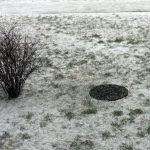Winter Weather and Its Impact on Your Septic System’s Drainage

1. Freezing Temperatures and Clogged Pipes
The most significant risk during winter is freezing temperatures, which can cause the water and wastewater within your septic system’s pipes to freeze. When this happens, the flow of water is restricted or completely blocked, leading to potential backups and overflows. To prevent frozen pipes, insulate exposed pipes with pipe sleeves or heating cables and consider using insulation blankets over your septic tank.
2. Snow and Ice Accumulation on Drainage Fields
The accumulation of snow and ice can also affect the performance of your septic system’s drainage fields. When the ground is frozen, the absorption capacity of the soil is reduced, making it difficult for the wastewater to be properly treated and absorbed. Additionally, heavy snowfall can result in excessive weight on the drain field, which can lead to soil compaction and further impact the drainage efficiency.
To minimize the impact of snow and ice accumulation, it is crucial to be proactive in clearing snow from the drainage field area. Shoveling or plowing should be done carefully to avoid damaging any septic system components, such as inspection ports and covers. It is advisable to seek professional assistance if you are unsure about the proper method of clearing snow from your septic system area.
3. Melting Snow and Increased Water Load
As temperatures rise, the accumulated snow begins to melt, potentially creating significant challenges for your septic system’s drainage. The sudden influx of water from melting snow can overload the system, putting excessive pressure on the drain pipes and the septic tank. This increased water load can result in system backups, leakage, or even complete failure.
To manage the increased water load effectively, minimize unnecessary water usage during the snowmelt period. Avoid activities like doing multiple loads of laundry or taking long showers, and ensure any leaks or dripping faucets are promptly repaired. Proper water management during this period can help prevent excessive stress on the septic system and maintain optimal drainage.
4. Regular Inspections and Maintenance
To ensure the smooth functioning of your septic system during winter, it is vital to invest in regular inspections and maintenance. A professional inspection by a certified septic system technician can identify any potential issues and provide you with the necessary recommendations and solutions. Regular pumping and cleaning of the septic tank are also essential to prevent solids from accumulating and potentially causing clogs in the system.
During winter, it is crucial to schedule regular maintenance before the colder months begin. This allows any potential problems to be addressed in advance, minimizing the risk of system failure during the winter season. By being proactive in your septic system maintenance, you can prevent costly repairs and ensure optimal drainage even in harsh winter weather conditions.
Winter weather can significantly impact the functionality of your septic system’s drainage. Freezing temperatures, snow, ice accumulation, and increased water load pose potential risks that can lead to drain clogs, backups, or even system failure. However, by taking necessary preventive measures and following a regular maintenance routine, you can protect your septic system and maintain efficient drainage throughout the winter. Remember to insulate exposed pipes, clear snow carefully from the drainage fields, manage water usage during the snowmelt period, and invest in regular inspections and maintenance. With these practices in place, you can confidently navigate the winter season without worrying about your septic system’s drainage.
If you’d like to schedule an appointment to make sure your system is in tip-top shape before the winter months hit, be sure to contact us today!
Categorised in: Septic System Maintenance